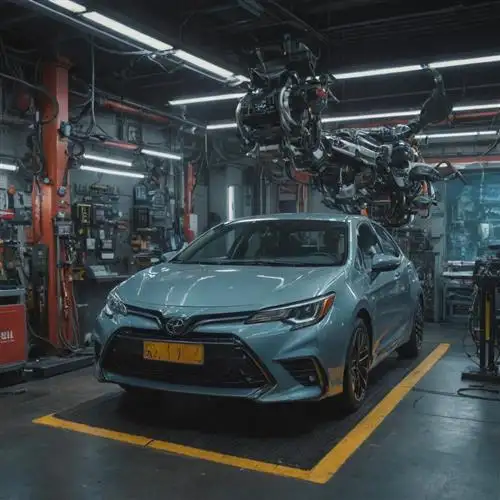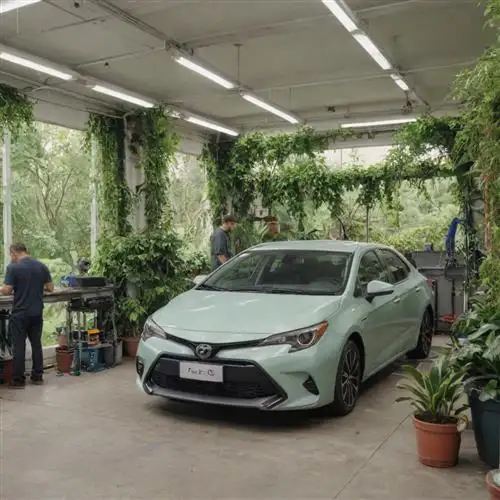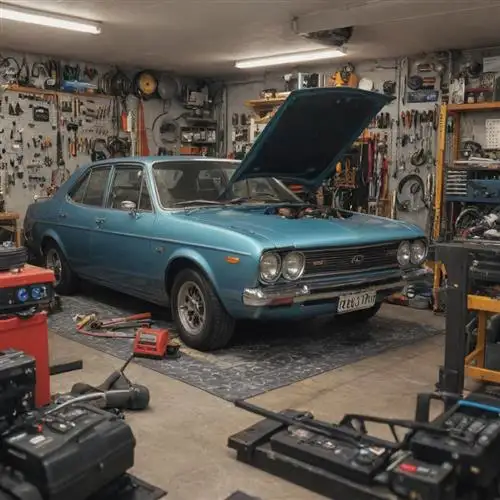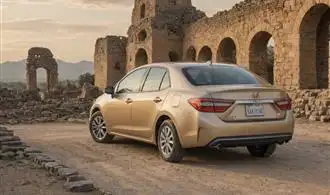
Recommended Maintenance Schedule
The Toyota Corolla is renowned for its reliability and longevity, but maintaining it properly is key to ensuring its performance and longevity. The recommended maintenance schedule is designed to keep your Corolla running smoothly and efficiently, helping you avoid costly repairs down the line. Here's a detailed look at the recommended maintenance schedule for your Toyota Corolla.
Oil Changes: One of the most essential maintenance tasks for your Corolla is regular oil changes. Toyota recommends changing the oil and oil filter every 5,000 to 10,000 miles, depending on driving conditions. Be sure to use the recommended oil weight and type specified in your owner's manual for optimal engine performance.
Tire Rotations and Wheel Alignments: Rotating your Corolla's tires every 5,000 to 7,500 miles can help ensure even tire wear and improve fuel efficiency. Additionally, having your wheels aligned every 12 months or when you notice uneven tire wear can help extend the life of your tires and improve the vehicle's handling.
Brake Inspections: Your Corolla's brakes are a critical safety feature, and it's important to have them inspected regularly. Toyota recommends having your brakes inspected every 12 months or 12,000 miles, whichever comes first. This will help ensure that your brake pads, rotors, and calipers are in good condition and functioning properly.
Cabin Air Filter Replacement: The cabin air filter in your Corolla helps keep the air inside the vehicle clean and free of pollen, dust, and other contaminants. Toyota recommends replacing this filter every 12 months or 15,000 miles to ensure optimal air quality and engine performance.
Fluid Flushes: Over time, the fluids in your Corolla can break down and become contaminated, which can lead to system failures. Toyota recommends flushing and replacing the transmission fluid every 30,000 miles, the coolant every 60,000 miles, and the brake fluid every 24 months.
Battery and Electrical System Checks: Your Corolla's battery and electrical system are essential for starting the vehicle and powering its various components. Toyota recommends having the battery and electrical system checked every 12 months to ensure they are in good working order.
Routine Inspections and Checks
Keeping your Toyota Corolla in peak condition requires a diligent approach to routine inspections and checks. As the backbone of your vehicle's health, these essential maintenance tasks ensure your Corolla runs smoothly, efficiently, and safely for years to come. In this comprehensive guide, we'll dive into the crucial components that demand regular attention, empowering you to proactively care for your beloved Corolla.
Engine Oil and Filter Replacement: The lifeblood of your Corolla's engine, engine oil plays a vital role in lubrication and heat dissipation. Adhering to the manufacturer's recommended oil change intervals is paramount, typically ranging from 5,000 to 10,000 miles. Neglecting this routine can lead to premature wear and tear on critical engine parts. Coupled with oil changes, replacing the oil filter ensures contaminants are captured, preserving the integrity of the oil.
Tire Rotation and Inspection: Rotating your Corolla's tires at the recommended intervals, often every 5,000 to 8,000 miles, promotes even tread wear and improved handling. During these rotations, inspect the tires for signs of uneven wear, damage, or insufficient tread depth. Maintaining proper tire pressure, as specified in your owner's manual, is another crucial step in extending the lifespan of your tires and ensuring a smooth, safe ride.
Brake System Evaluation: The braking system is the primary safety component in your Corolla, and it requires vigilant attention. During routine inspections, have your technician examine the brake pads, rotors, calipers, and brake fluid levels. Replacing worn brake pads and ensuring the system is functioning optimally will give you peace of mind and contribute to your Corolla's overall safety.
Fluid Level Checks: Your Corolla relies on a variety of fluids to operate efficiently, including transmission fluid, power steering fluid, and coolant. Regularly checking and replenishing these fluids as needed, in accordance with the manufacturer's recommendations, helps prevent costly issues down the line.
Wiper Blade Replacement: Your Corolla's wiper blades play a crucial role in maintaining clear visibility, especially during inclement weather. Inspect the blades for cracks, streaks, or signs of deterioration, and replace them every 6 to 12 months to ensure optimal performance.
DIY Maintenance Tasks
As a professional content writer, I'm excited to provide an in-depth and highly insightful article on "The Ultimate Guide to Toyota Corolla Maintenance" with a focus on "DIY Maintenance Tasks." Toyota Corolla owners who are interested in maintaining their vehicles themselves will find this article invaluable.
Keeping your Toyota Corolla in top condition doesn't have to be a daunting task. With the right knowledge and a few basic tools, you can perform many maintenance tasks yourself, saving time and money. Let's dive into the essential DIY maintenance tasks every Corolla owner should be aware of.
Oil and Filter Changes: Regularly changing your Corolla's oil and filter is one of the most crucial maintenance tasks. Refer to your owner's manual for the recommended oil type and frequency, typically every 5,000 to 10,000 miles. Performing this task yourself is relatively straightforward and can be done with a few basic tools, such as an oil filter wrench and a drain pan.
Tire Rotation and Balancing: Rotating your Corolla's tires as recommended, usually every 5,000 to 8,000 miles, can help ensure even wear and maximize the life of your tires. Balancing the tires is also important to maintain a smooth ride and prevent uneven tire wear.
Brake Pad Replacement: Over time, your Corolla's brake pads will wear down and need to be replaced. Depending on your driving habits, this task may be required every 30,000 to 50,000 miles. Replacing the brake pads yourself can be a bit more challenging, but with the right tools and guidance, it's a task that many DIY-inclined Corolla owners can tackle.
Air Filter Replacement: Your Corolla's air filter plays a crucial role in keeping the engine running efficiently. Replacing the air filter every 12,000 to 15,000 miles is a simple task that can be done in a matter of minutes, often without any tools.
Cabin Air Filter Replacement: In addition to the engine air filter, your Corolla also has a cabin air filter that should be replaced every 12,000 to 15,000 miles. This filter helps keep the air inside the cabin clean and fresh, and it's another easy DIY maintenance task.
Windshield Wiper Blade Replacement: Worn or damaged windshield wiper blades can compromise your visibility and safety. Replacing them is a straightforward task that requires minimal tools and can be done in a matter of minutes.
Common Maintenance Issues
The Toyota Corolla is renowned for its reliability and longevity, but even this reliable vehicle requires regular maintenance to keep it running at its best. One of the most common maintenance issues with the Toyota Corolla is the need for regular oil changes. The manufacturer recommends changing the oil every 5,000 to 10,000 miles, depending on driving conditions. Neglecting this important task can lead to engine wear and reduced fuel efficiency.
Another common issue is tire wear and rotation. The Toyota Corolla's tires should be rotated every 5,000 to 8,000 miles to ensure even wear. Failing to rotate the tires can cause uneven wear, leading to the need for premature tire replacement. It's also important to check the tire pressure regularly and maintain the recommended pressure to improve fuel economy and handling.
Brakes are another critical component that require regular maintenance in the Toyota Corolla. The brake pads and discs should be inspected regularly for wear and replaced as needed. Neglecting the brakes can lead to decreased stopping power and increased risk of accidents. Drivers should also be aware of any noises or vibrations coming from the brakes, as these can be signs of a problem that should be addressed promptly.
The Toyota Corolla's air filter is another component that requires regular attention. A clogged air filter can reduce engine performance and fuel efficiency. Replacing the air filter according to the manufacturer's recommendations can help maintain the vehicle's performance and reduce emissions.
Finally, the Toyota Corolla's cooling system is essential for keeping the engine running at its optimal temperature. The coolant should be flushed and replaced according to the manufacturer's schedule to prevent overheating and engine damage. Neglecting the cooling system can lead to costly repairs down the line.
Maintenance Cost Considerations
When it comes to the Toyota Corolla, maintenance costs are a crucial factor to consider. This reliable and affordable sedan is known for its longevity, but proper upkeep is essential to ensure it continues to perform at its best. Let's explore the various aspects of Corolla maintenance costs and what you can expect as an owner.
One of the primary advantages of the Corolla is its cost-effective maintenance. Toyota designs its vehicles with durability in mind, and the Corolla is no exception. Many of the routine maintenance tasks, such as oil changes, tire rotations, and brake pad replacements, are relatively inexpensive compared to other vehicle models. Additionally, the Corolla's components are engineered to have a longer lifespan, which can translate to fewer repair costs over the years.
Another factor to consider is the availability and affordability of genuine Toyota parts. As a widely popular model, the Corolla benefits from a vast network of authorized Toyota dealers and independent mechanics who can readily source genuine replacement parts. This accessibility helps to keep maintenance and repair costs manageable, as you can avoid the higher prices often associated with aftermarket parts.
Fuel efficiency is another area where the Corolla shines in terms of maintenance costs. With its impressive gas mileage ratings, the Corolla requires less frequent refueling, leading to lower overall fuel expenses. This can be especially beneficial for drivers who commute long distances or have high annual mileage.
It's important to note that while the Corolla is generally known for its low maintenance costs, certain factors can still impact the overall expenses. For instance, the specific driving conditions, such as frequent towing, harsh weather, or heavy traffic, can lead to accelerated wear and tear on certain components, requiring more frequent maintenance or replacement. Additionally, the age and mileage of the Corolla can also influence the maintenance costs, as older vehicles may require more comprehensive servicing.
To ensure you maintain your Corolla efficiently and cost-effectively, it is recommended to follow the manufacturer's recommended maintenance schedule. This schedule outlines the specific intervals for routine services, such as oil changes, tire rotations, and fluid replacements. Adhering to this schedule can help you avoid potential issues and keep your Corolla running smoothly for years to come.
Aftermarket Parts and Accessories
When it comes to the Toyota Corolla, the options for aftermarket parts and accessories are vast and diverse. While the Corolla is renowned for its reliability and longevity, many owners seek to personalize their vehicles or enhance their performance and functionality. In this section, we'll explore the world of aftermarket Corolla upgrades, highlighting the best options and considerations for those looking to take their Toyota to the next level.
One of the most popular aftermarket categories for the Corolla is exterior accessories. From sleek body kits and spoilers to custom wheels and tires, there's no shortage of ways to give your Corolla a unique and aggressive look. When selecting these upgrades, it's essential to ensure compatibility with your specific model year and trim level, as well as to prioritize quality over cost. Investing in high-quality, reputable brands can ensure a seamless fit and long-lasting performance.
Performance-minded Corolla owners may also be interested in exploring the world of engine and exhaust modifications. Upgrades such as cold air intakes, high-flow catalytic converters, and custom exhaust systems can provide a noticeable boost in power and throttle response. However, it's crucial to research and understand the legal and emissions requirements in your area, as well as the potential impact on fuel efficiency and overall reliability.
Beyond the mechanical and aesthetic upgrades, the Corolla also lends itself well to a variety of interior enhancements. Aftermarket infotainment systems, premium audio upgrades, and custom upholstery can breathe new life into the cabin, creating a more personalized and enjoyable driving experience. When considering these upgrades, it's essential to ensure that they are compatible with your Corolla's existing electrical and mechanical systems, and to work with reputable installers to avoid any complications.

















